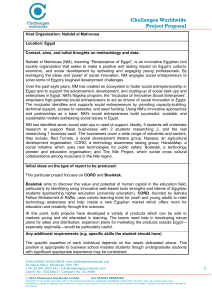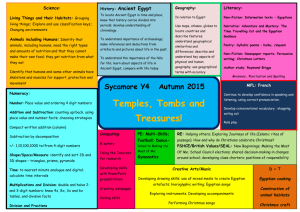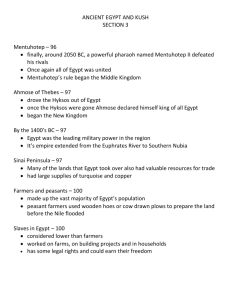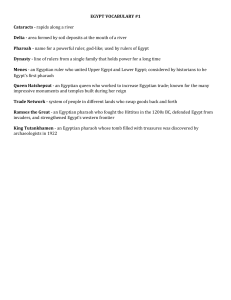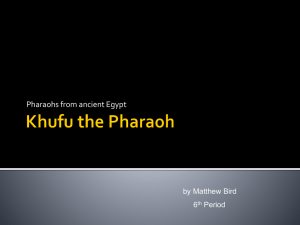Read entire testimony - American Research Center in Egypt
advertisement
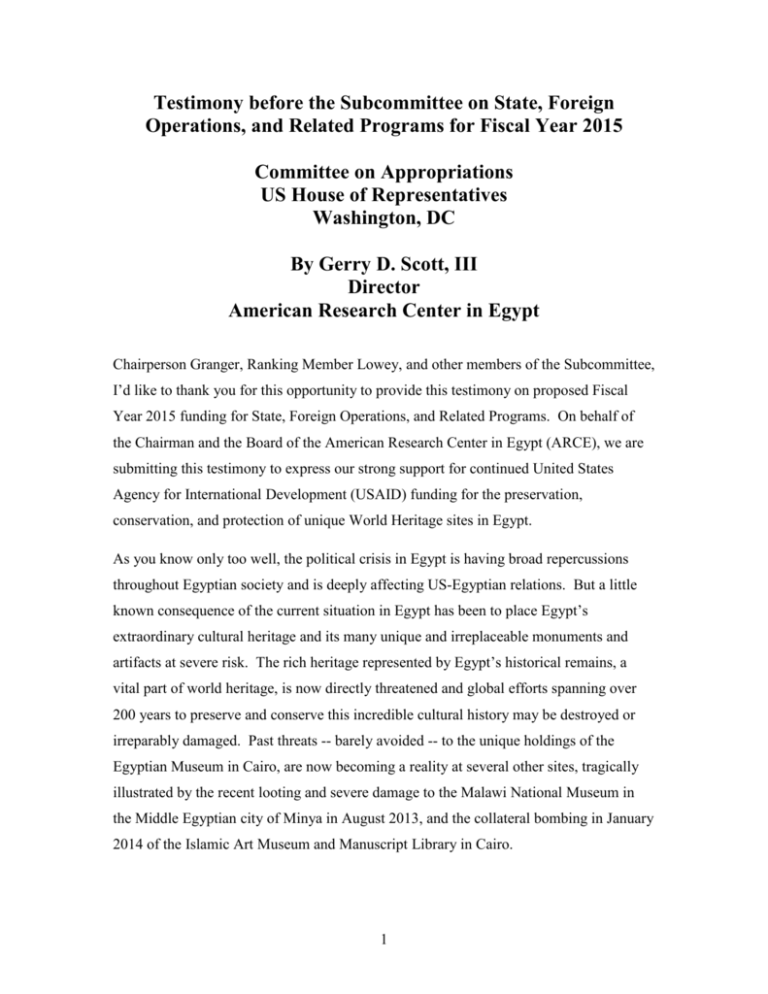
Testimony before the Subcommittee on State, Foreign Operations, and Related Programs for Fiscal Year 2015 Committee on Appropriations US House of Representatives Washington, DC By Gerry D. Scott, III Director American Research Center in Egypt Chairperson Granger, Ranking Member Lowey, and other members of the Subcommittee, I’d like to thank you for this opportunity to provide this testimony on proposed Fiscal Year 2015 funding for State, Foreign Operations, and Related Programs. On behalf of the Chairman and the Board of the American Research Center in Egypt (ARCE), we are submitting this testimony to express our strong support for continued United States Agency for International Development (USAID) funding for the preservation, conservation, and protection of unique World Heritage sites in Egypt. As you know only too well, the political crisis in Egypt is having broad repercussions throughout Egyptian society and is deeply affecting US-Egyptian relations. But a little known consequence of the current situation in Egypt has been to place Egypt’s extraordinary cultural heritage and its many unique and irreplaceable monuments and artifacts at severe risk. The rich heritage represented by Egypt’s historical remains, a vital part of world heritage, is now directly threatened and global efforts spanning over 200 years to preserve and conserve this incredible cultural history may be destroyed or irreparably damaged. Past threats -- barely avoided -- to the unique holdings of the Egyptian Museum in Cairo, are now becoming a reality at several other sites, tragically illustrated by the recent looting and severe damage to the Malawi National Museum in the Middle Egyptian city of Minya in August 2013, and the collateral bombing in January 2014 of the Islamic Art Museum and Manuscript Library in Cairo. 1 Founded in 1948, the American Research Center in Egypt is the oldest organization in the United States dedicated to working with the broad based US academic community and university system, as well as other research organizations, to preserve, conserve, explore, and catalogue Egypt’s cultural heritage and to improve Egypt’s ability to preserve and protect its own irreplaceable sites. Given this focus, ARCE plays a critical role in fostering strong cultural ties between the U.S. and Egypt. Made up of over 30 institutions dedicated to the study of Egyptology and the preservation of Egyptian antiquities, ARCE is the leader of a coordinated effort to focus on all aspects of Egypt’s rich cultural heritage spanning the ancient Pharaonic period, as well as historically significant Christian and Islamic sites of more recent eras. ARCE members include prestigious universities and museums such as Johns Hopkins University, Brown University, the University of California system, the University of Chicago, Georgia State University, New York University, the University of Pennsylvania, Yale University, the Metropolitan Museum of Art, the Los Angeles County Museum of Art, and the Getty Conservation Institute among others, all of which have made critical efforts at the multiple sites in Egypt where they work. ARCE itself undertakes conservation projects and training activities in Egypt, as well as maintaining an essential coordinating office in Cairo, working tirelessly on behalf of its members in securing permission to work within Egypt, and performing a unique role in training and developing Egypt’s own human resources, specifically in the areas of archaeology, preservation, conservation and cataloging skills. Over 1000 Egyptians today have directly benefited from ARCE sponsored training programs that are designed to build their capabilities to protect and preserve their own cultural past. ARCE training in the critical cataloguing area has created a database of Egyptian artifacts and collections in the Cairo Museum that is literally invaluable in protecting Egypt’s current holdings. All ARCE supported projects are at World Heritage designated sites. While receiving financial support from its members and individual donors, in recent decades ARCE activities and those of its many member organizations have been either directly or indirectly supported by invaluable, targeted USAID funding. This visionary support by the US government has enabled ARCE and its member universities and 2 organizations to take extraordinary steps in recent years to preserve and conserve unique world heritage sites in Egypt. Today this impressive progress is seriously at risk. US government support and involvement in ensuring the protection of these sites and unique collections is now more important than ever; without it, the losses to Egypt’s shared global history could be devastating. While we are well aware that overall US government funding is highly constrained in the current budget environment, it is nonetheless critical that funds currently available for Egypt be considered for funding activities like those undertaken by ARCE and its US members in support of the critical preservation of Egypt’s shared world heritage. It is also important to note that the Committee on Appropriations has played an essential role over the past twenty years in helping to ensure the preservation of Egypt's irreplaceable global heritage. Because of its experience in conducting cultural research and fieldwork in Egypt and its ability to foster American-Egyptian relations in the areas of culture and education, ARCE was selected to undertake an important initiative by the Committee to provide funding for the preservation and restoration of Egypt’s cultural heritage. In a visionary step, it was the subcommittee on Foreign Operations that initiated funding for the preservation of Egypt's global legacy through a grant from USAID. Under this grant, a broad program of work was initiated that included conservation of historically and culturally significant architecture, works of art, religious inscriptions, and archaeological artifacts representing thousands of years of Egypt’s historical and cultural achievement, as well as a broad range of training programs for Egyptians related to conserving and preserving this invaluable legacy. The results of this program have been far ranging and monuments that were on the verge of being lost have been saved and are now open to the public. In addition, hundreds of Egyptians have received technical training in various fields of heritage management, culturally significant objects have been preserved, and these results have been shared with the scholarly, professional, and general public through a series of publications. The work stands as a testament to the significant contribution that the United States of America has made to preserve Egypt’s cultural heritage as embodied in its magnificent 3 monuments for future generations, as well as helping to insure that tourism can remain an important part of Egypt’s economy. In addition, ARCE has received follow on program grants from USAID, the most recent of which will conclude in July 2014. The timing of the end of this critical USAID support could not be worse. World Heritage sites are now highly vulnerable to looting and destruction, the recent bombing near the Islamic Museum being a prime example of this threat. Our member organizations, as well as our Egyptian colleagues and partners, are reporting greatly increased looting and destruction at key archeological sites throughout Egypt. USAID support is one of the few tools currently available to help protect these highly vulnerable but irreplaceable historic sites. In addition, during all the violence in Cairo and Egypt, ARCE activities have continued in operation and our staff has continued their work, even in times of diminished security. Our strong working relationship with USAID was confirmed once again by a timely grant by USAID of 1 million Egyptian pounds for emergency support at the severely damaged Islamic museum. We highly value our relationship with USAID and we believe it is critical that it go forward uninterrupted. Absent a new follow on grant, ARCE soon will be forced to downsize its staff in Cairo and this loss in expertise will be a tremendous blow to the US government's and ARCE's ability to help the Egyptian people at this very difficult time. Because of the significance of these grants for the preservation of Egypt’s cultural heritage, to the overall cultivation of the relationship between Egypt and the U.S., and to the vitality of the American Research Center in Egypt, we strongly urge the Committee and the Congress to continue to make such follow on programmatic grants available for this important work. Thank you very much for your consideration. 4




